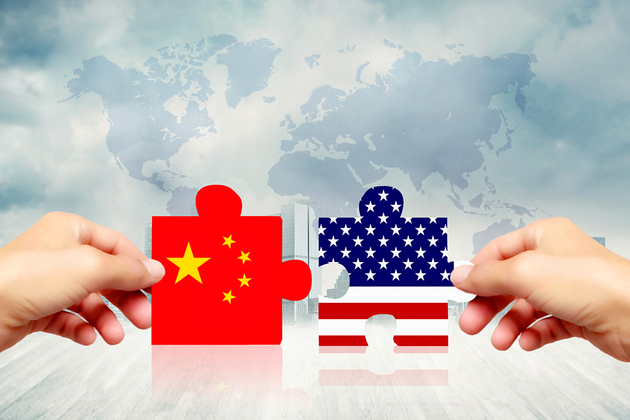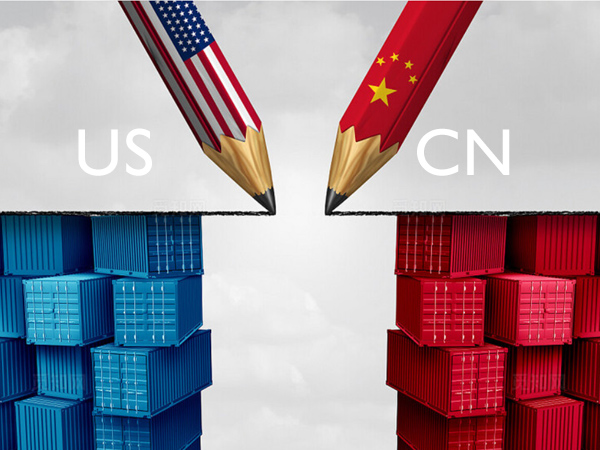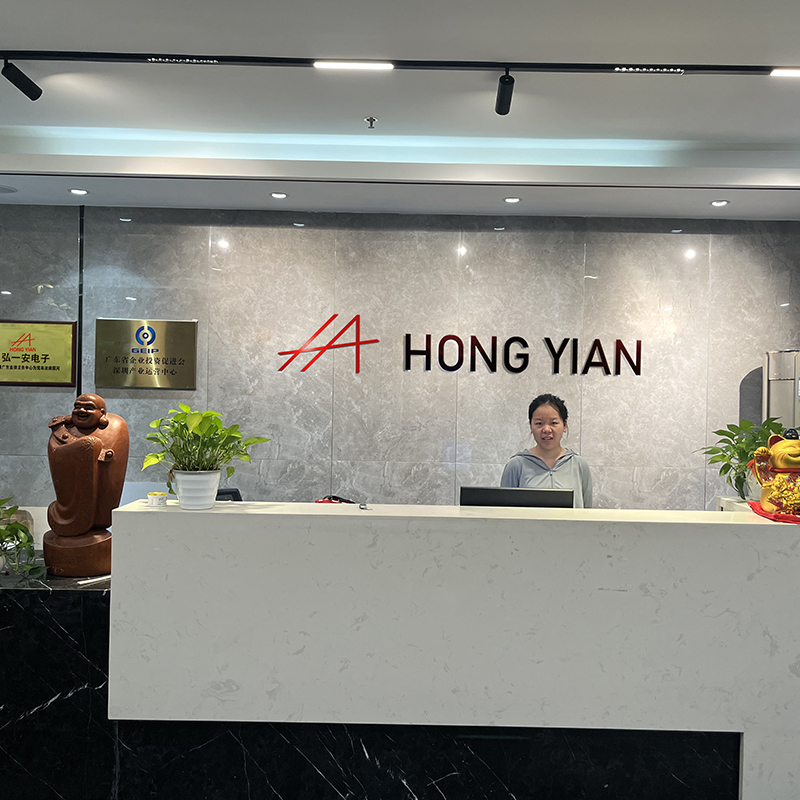US-China Trade War 2025: Foreign Trade Challenges under the Tariff Storm and Hong Yi An‘s Way of Breaking the Game
Time:2025-04-16
Views:581
US-China trade war 2025: a storm of tariffs sweeps global markets
In 2025, the US-China trade war enters a white-hot phase. The U.S. government announced tariffs of up to 125% on Chinese imports, covering a wide range of sectors including electronics, machinery and equipment, and consumer goods. China quickly countered by imposing a 34% tariff on US goods, with the cumulative tariff percentage approaching 100%. This round of high-intensity tariff gaming triggered dramatic volatility in global markets, making it one of the hottest economic topics of 2025.
Markets reacted quickly, with the U.S. seeing significant stock market gains as it held off on tax hikes on other countries, with the Dow Jones up 7.87% and the Nasdaq up 12.16% in a single day. However, China, as the hardest hit by tariffs, is facing increased pressure on exports, increased fluctuations in the RMB exchange rate, and the profit margins of foreign trade enterprises have been further compressed. Experts predict that the second phase of the trade war could lead to a 0.5-1 percentage point drop in China‘s GDP growth, with export-oriented industries bearing the brunt.
The far-reaching impact of the U.S.-China trade war on China‘s economy
The root cause of the U.S.-China trade war lies in the long-standing differences between the two sides over trade deficits, technological competition and intellectual property protection. The U.S. has tried to reshape the global supply chain through high tariffs, while China has defended its interests with reciprocal tariffs and policy support. 2025 tariff escalation further complicates the game.
Shrinking export market: the US is China‘s second largest export market, accounting for about 16% of China‘s total exports. 125% tariffs have significantly pushed up the prices of Chinese goods and weakened their competitiveness in the US market. 2022 data show that the trade war has already caused China‘s exports to the US to fall by about 15%, a trend that could be further exacerbated by high tariffs in 2025.
Supply chain reconfiguration pressure: To avoid tariffs, some Chinese companies have shifted their production bases to countries such as Vietnam and India. However, new U.S. tariffs are targeting these “bypassed” supply chains, increasing operating costs and market uncertainty.
Domestic economic challenges: A decline in exports could be a drag on economic growth, while higher consumer prices will push up inflationary pressures. Small and medium-sized enterprises (SMEs) face greater risks to their survival due to a lack of diversified markets.

Direct impact on China‘s foreign trade industry

Direct impact on China‘s foreign trade industry
As the world‘s largest trader of goods, China‘s foreign trade sector plays a significant role in the national economy. 2025 tariff wars will impact the sector in the following ways:
Plummeting orders: High tariffs have led to a decline in the competitiveness of Chinese goods in the U.S. market, and orders from small and medium-sized foreign trade factories have plummeted, especially for high-value-added products such as electronic connectors and automotive parts.
Rising costs: supply chain adjustments, rising prices of raw materials and exchange rate fluctuations together to push up production costs, compression of corporate profit margins.
Market diversification needs: a single market with a high degree of dependence on the largest impact on enterprises, forcing the industry to accelerate the transition to the EU, ASEAN and other emerging markets.

Opportunities and challenges for China‘s foreign trade factories
The impact of the trade war on foreign trade factory practitioners is particularly significant. Those engaged in sales, purchasing, logistics and marketing face both tough challenges and opportunities for transformation.
Challenge: Double pressure on employment and skills
Risk of layoffs: Fewer orders have led to downsizing in some foreign trade factories, and salesmen and operators are at risk of losing their jobs.
Skill upgrading demand: the traditional foreign trade model has been difficult to adapt to the new situation, practitioners need to master digital marketing, multi-language communication and emerging market development skills.
Psychological pressure: the loss of customers, increased difficulty in negotiation and market uncertainty aggravate the professional anxiety of practitioners.
Opportunity: digitalization and diversification go hand in hand
Rise of cross-border e-commerce: independent sites and e-commerce platforms have become a new track for foreign trade, reaching overseas consumers directly and reducing reliance on traditional trade channels.
Emerging market potential: ASEAN, Africa and Latin America markets continue to grow in demand for high-quality products such as electronic connectors, providing new opportunities for practitioners.
Policy support: The Chinese government has energized the foreign trade industry through policies such as export tax rebates and financing support, easing the pressure on enterprises.

Macrobiotic: Breakout Pioneer in the Connector Field
In the high-pressure environment of trade war, Shenzhen Hong Yi An Electronics Co., Ltd (https://www.hongyian.cn/) has set up a transformation model for Chinese foreign trade enterprises with its high-quality connector products and forward-looking market strategy. Founded in 2012, Hong Yi An is a professional connector manufacturer headquartered in Shenzhen, specializing in the development and production of precision connectors, terminal blocks and cable assemblies. Its products cover: connector products, including headers, box connectors, DIN41612, IDC sockets, FPC, SCSI, D-Sub, waterproof power connectors and RJ45 modular sockets, are widely used in electronic devices, automotive, solar and industrial automation.
Customized service: Hong Yi An provides personalized design and production solutions to meet the diverse needs of customers in different markets.
Green Energy Contribution: As an innovative manufacturer in the automotive and solar sectors, Hong Yi An is committed to providing efficient and sustainable electrical solutions to support global green energy development.
Hong Yi An‘s success is attributed to its keen insight into market changes and active layout of digital transformation. By building a professional independent website (https://www.hongyian.cn/), Hong Yi An has achieved the following breakthroughs: Global Market Reach: The independent website supports multi-language and mobile optimization, which helps Hong Yi An to directly reach the end customers in Europe, America, ASEAN and other markets, and reduces the reliance on the U.S. market.
Efficient Marketing: Through SEO optimization and Google AdWords, Hong Yi An boosts website traffic, plus third-party foreign trade platforms and electronics industry trade shows to precisely target customer groups.
Data-driven decision-making: Integrated data analysis tools to monitor market demand in real time and optimize product pricing and inventory management.

For example, an electronic parts company that relies on the U.S. market has successfully explored the German and Malaysian markets with a 25% increase in orders through Hong Yi An‘s connector products. Hong Yi An not only provides high-quality products.

For example, an electronic parts company that relies on the U.S. market has successfully explored the German and Malaysian markets with a 25% increase in orders through Hong Yi An‘s connector products. Hong Yi An not only provides high-quality products.
Coping Strategies for Foreign Trade Practitioners
In the face of the challenges of the trade war, foreign trade practitioners need to take the initiative to adapt to the new situation, the following are a few practical suggestions:
Embrace digital transformation: use independent websites and cross-border e-commerce platforms to enhance brand exposure, actively participate in various global electronics industry exhibitions to enhance industry awareness, and efficiently deal with precise target customers.
Explore emerging markets: focus on ASEAN, the EU and the countries along the “Belt and Road”, and study local market demand and trade policies.
Enhance professional ability: Learn digital marketing, international trade rules and multi-language communication skills to enhance competitiveness in the workplace.
Leverage policy support: Actively apply for export tax rebates, financing support and other policy bonuses to reduce operating costs.





